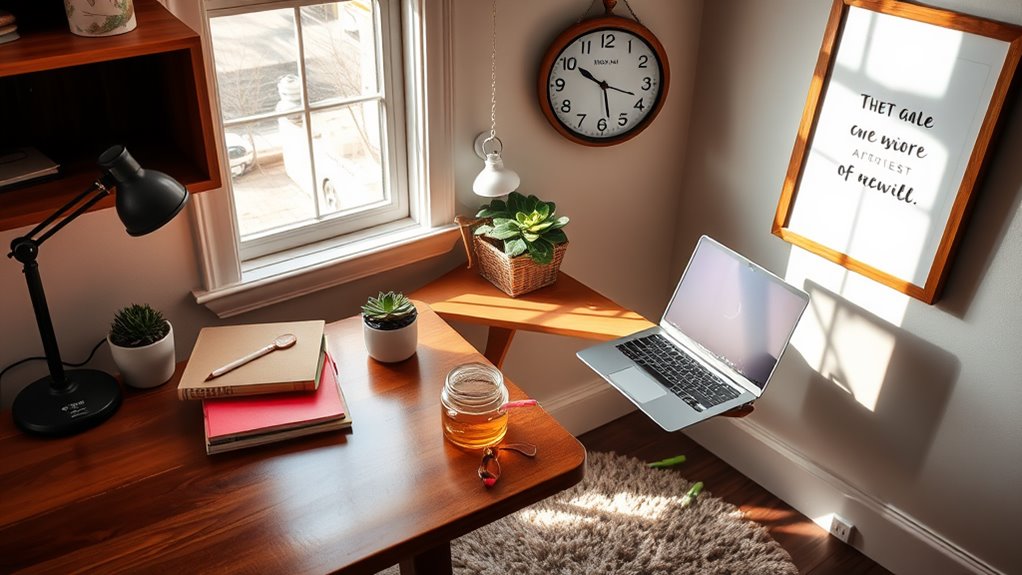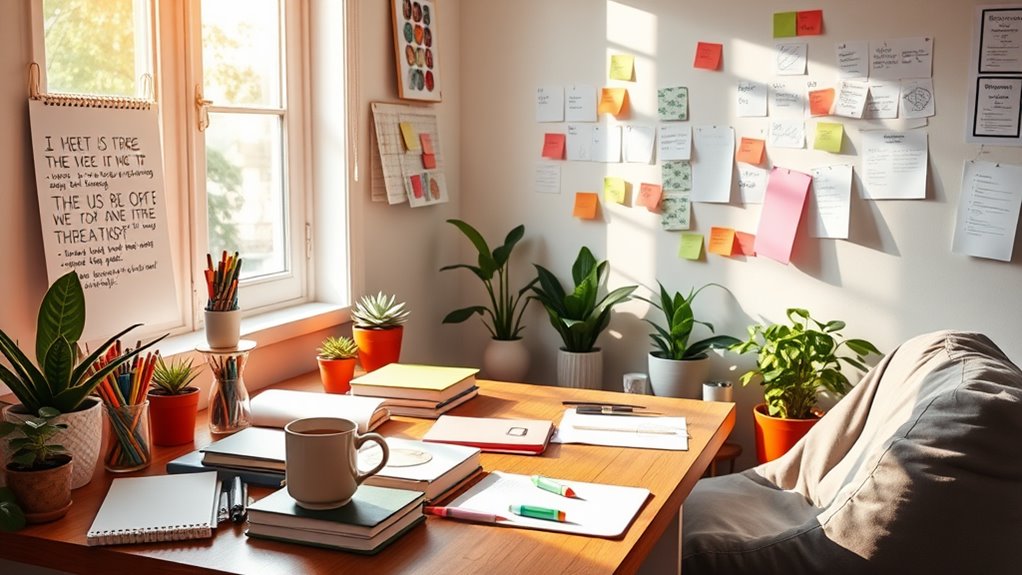Study Routines That Turn Procrastinators Into A+ Students
To turn procrastination into academic excellence, you need to establish effective study routines. Start by identifying your triggers, like perfectionism or distractions. Use time management techniques like the Pomodoro Technique to create focused study sessions followed by breaks. Set up a calm, organized study space to eliminate distractions and enhance concentration. Develop consistent habits by scheduling regular study times and prioritizing tasks. Finally, stay motivated by setting achievable goals and rewarding yourself for milestones. With these strategies, you’ll find a path to academic success. Discover more transformative tips to release your potential!
Key Takeaways
- Establish a consistent study schedule to create routine and discipline, reducing the tendency to procrastinate.
- Utilize the Pomodoro Technique to maintain focus through short, timed study sessions followed by breaks.
- Organize your study environment by removing distractions and ensuring materials are easily accessible to enhance concentration.
- Set clear, achievable goals and reward yourself for completing tasks, reinforcing positive study habits.
- Regularly review notes and connect your studies to personal interests to boost motivation and retention.
Understanding Procrastination Triggers
While you might think procrastination is simply a lack of motivation, understanding what triggers it can help you tackle the issue more effectively. Often, fear of failure or perfectionism holds you back. When you dread not meeting high standards, it’s easy to put off tasks.
Additionally, distractions like social media or a cluttered environment can derail your focus. Identifying these triggers is essential; it allows you to create strategies to combat them. For instance, if you find yourself distracted by your phone, consider setting specific times for checking notifications.
Recognizing how your emotions and surroundings influence your behavior gives you the power to change your habits. Once you pinpoint these triggers, you can develop a proactive approach to studying and completing assignments.
Effective Time Management Techniques
Mastering effective time management techniques can make all the difference in your academic success. Start by prioritizing tasks using the Eisenhower Matrix, which helps you focus on what’s urgent and important. Break your study sessions into manageable chunks with the Pomodoro Technique, working for 25 minutes followed by a 5-minute break.
Here’s a simple table to guide you:
| Technique | Description |
|---|---|
| Eisenhower Matrix | Prioritize tasks based on urgency and importance. |
| Pomodoro Technique | Work for 25 minutes, take a 5-minute break. |
| Time Blocking | Schedule specific time slots for study sessions. |
| Daily To-Do List | Write down tasks to keep track of your progress. |
Implementing these techniques helps you stay focused and organized, leading to better results.
Creating an Ideal Study Environment
Effective time management sets the foundation for academic success, but the environment you study in can greatly impact your productivity.
Start by choosing a quiet, well-lit space where you feel comfortable and focused. Remove distractions; turn off notifications and keep your phone out of reach. Organize your study materials so everything’s within easy access.
Consider using noise-canceling headphones or soft background music to enhance concentration. Personalize your space with motivational quotes or plants to create a positive atmosphere.
Make sure your chair and desk are ergonomic to maintain comfort during long study sessions. Finally, maintain a consistent routine by studying in the same environment, helping your brain associate that space with focused work.
Developing Consistent Study Habits
As you endeavor for academic excellence, developing consistent study habits is essential for retaining information and achieving high grades.
Start by setting a regular study schedule. Choose specific days and times dedicated to studying, so it becomes a routine.
Break your study sessions into manageable chunks, using techniques like the Pomodoro Technique, where you study for 25 minutes and take a 5-minute break. This keeps your mind fresh and focused.
Create a to-do list to prioritize tasks, ensuring you tackle the most challenging subjects first.
Consistency is key, so try to study in the same location each time to build a conducive environment.
Finally, review your notes regularly to reinforce what you’ve learned and make adjustments to your study strategies as needed.
Motivation Strategies for Success
While staying focused on your studies can be challenging, implementing motivation strategies can make a significant difference in your academic journey.
Start by setting clear, achievable goals. Break your tasks into smaller steps, and reward yourself when you complete each one.
Visualize your success; imagine how reaching your objectives will feel. Surround yourself with positive influences, whether it’s friends who encourage you or inspirational quotes that resonate with you.
Establish a study routine that works for you, and stick to it. Keep your study space organized and free from distractions.
Ultimately, remind yourself why you’re pursuing your studies; connecting to your purpose can reignite your passion and drive.
With these strategies, you’ll find the motivation to excel.
Frequently Asked Questions
How Can I Stay Focused While Studying in a Noisy Environment?
To stay focused in a noisy environment, try using noise-canceling headphones or listening to calming music. Set clear study goals and take regular breaks to maintain your concentration and avoid feeling overwhelmed.
What Are Some Apps to Help Manage My Study Schedule?
To manage your study schedule, try apps like Todoist, Trello, or Forest. They’ll help you organize tasks, set deadlines, and stay motivated. You’ll find it easier to keep track of your study commitments.
How Do I Deal With Distractions From Social Media?
To deal with distractions from social media, set specific time limits for checking your accounts. Use apps that block notifications during study sessions, and create a focused environment that encourages productivity without those constant interruptions.
Can Music Enhance My Concentration While Studying?
Absolutely, music can enhance your concentration while studying. It creates a stimulating environment, helping you focus better. Just choose instrumental tracks or low-tempo tunes to minimize distractions and keep your mind engaged with the material.
What Should I Do if I Feel Overwhelmed by My Workload?
When you feel overwhelmed by your workload, take a deep breath, prioritize tasks, and break them into smaller steps. Don’t hesitate to ask for help or take short breaks to recharge your focus.





